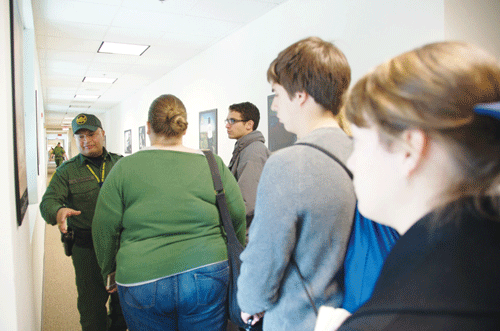
United States Border Patrol officer Juan Guajardo gives a tour of the Tucson Sector Border Patrol office to SMU students who took part in the United States-Mexico Research Project Mexico symposium this past January. (JORDAN CHLAPECKA/ Student Media Company)
The U.S.-Mexican border has been a much-debated ethical and political topic in recent years. Human rights concerns on the border alarm humanitarian organizations and socially conscious citizens.
Because of these human rights problems, SMU’s Student Leadership Initiative (SLI) launched their inaugural program, The Border Project.
SLI works as a way for student leaders to research and investigate human rights concerns in regions of global interests. SLI is affiliated with the Embrey Human Rights Program at SMU.
Students Jordan Johansen and Adriana Martinez, who is a member of the Daily Campus staff, co-founded SLI in the summer of 2010.
In January 2011, eight students visited the US-Mexico border in Tucson and Nogales, Ariz. The purpose of the trip was to research human rights concerns pertaining to migrants. Each student investigated a related topic of his or her choosing, conducting interviews and research in the field.
The eight scholars are Jordan Chlapecka, Michael Dearman, Caroline Dillard, Jordan Johansen, Bernardo Lopez, Adriana Martinez, Daniel Sanabria and Rachel Stonesipher.
The symposium included a welcoming address by Patricia Davis, PhD. and opening remarks from Rick Halperin, PhD., followed by a greeting from the Assistant Chief of Police Jim Walters about AMBER Alert’s work on the border.
In his opening remarks, Halperin commented on how the SLI selected the US-Mexico border as the initiative’s first program. “Human rights begin at home,” Halperin said.
Martinez introduced the SLI, as well as the eight student presentations.
Presenting on “organizational health care reform agendas,” sophomore Stonesipher addressed the implementation water stations, the alarming health concerns in the desert areas and humanitarian group advocacy.
“Much public controversy is focused on water stations, whether or not [the state government] should allow it,” Stonesipher said.
First year Dearman’s presentation revolved around “faith-based organizations that offer humanitarian aid to undocumented migrants,” citing humanitarian groups such as No More Deaths, Los Samaritans, and various other church-affiliated organizations.
“Christianity is alive and well on the US-Mexico Border,” Dearman remarked at the end of his presentation.
Taking a different approach to migrant human rights concerns, senior Chlapecka presented on the “formation of identity on the border” regarding the “influence on imagery on a group of people.”
Chlapecka discussed the imagery inside of the border patrol stations, explaining that such images depicted “the border patrol as heroes but makes migrants look less human.”
The symposium took place on April 18th at 5:30 p.m. in McCord Auditorium, gathering human rights minors, socially conscious students and various members of the greater SMU and Dallas communities.
The Border Project worked in conjunction with AMBER Alert. Phil Keith, Director of Training and Technical Assistance, Jim Walters and Mark Simpson assisted SLI in the interview and research process.
The Border Project was a collaborative effort of many professionals along with SLI.
Anthology faculty member Robert Van Kemper, PhD., Ben Johnson, PhD. of the Clements Center for Southwestern Studies, Kim Cobb of Public Affairs, Walters and Halperin taught the seminar. Reverend Robin Hoover, PhD., was SLI’s guide and mentor in the Tucson area.








